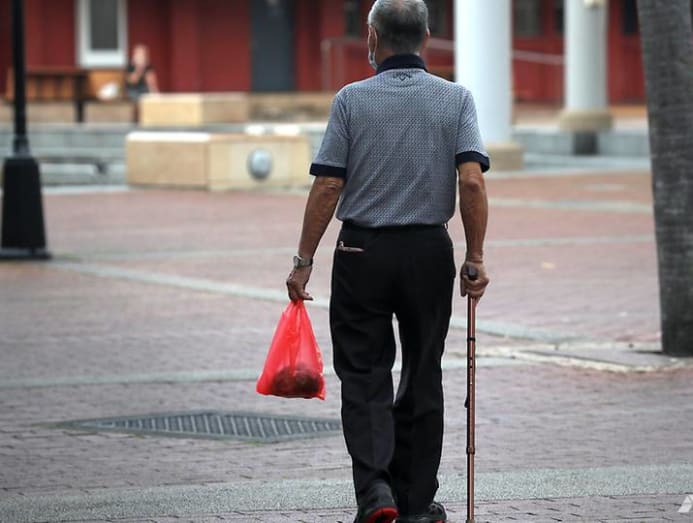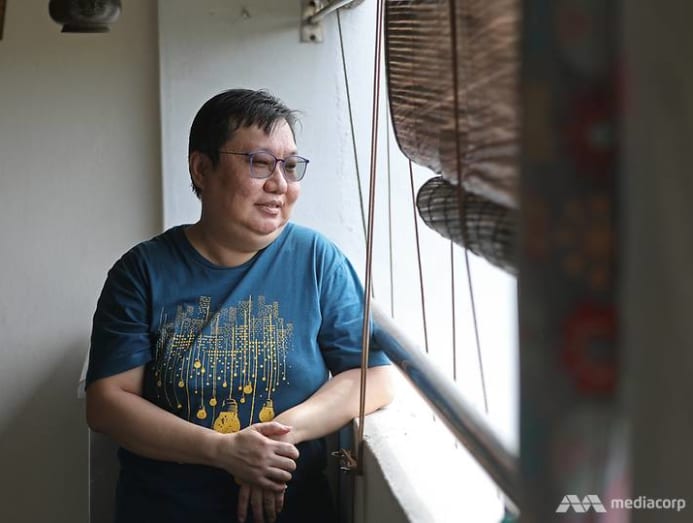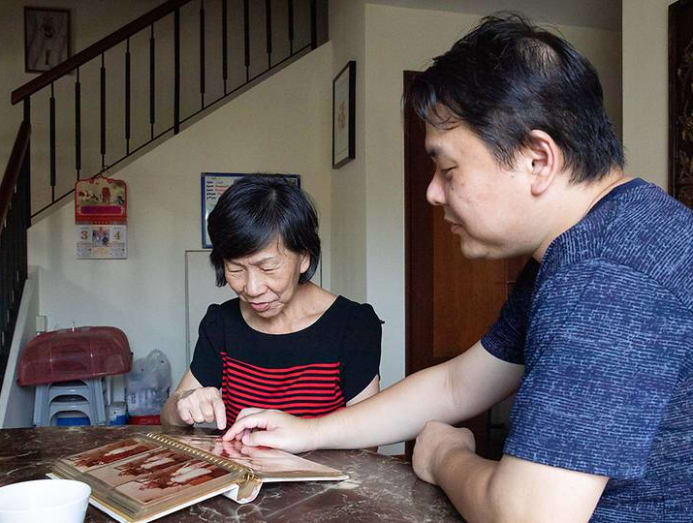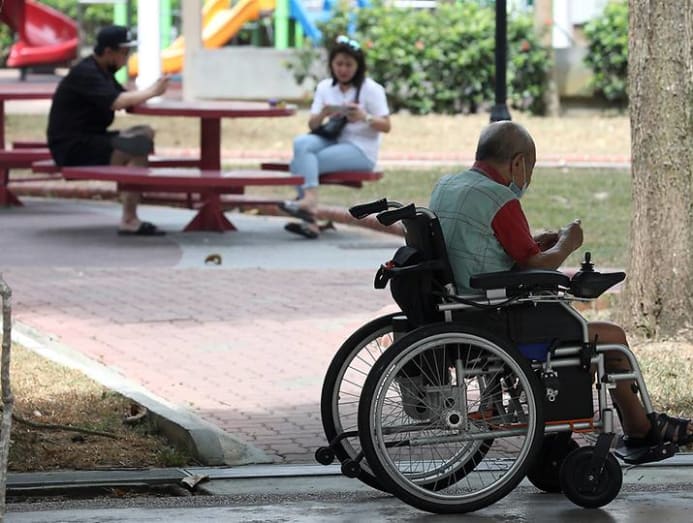The Big Read: As Singapore society ages, who will care for the caregivers?
SINGAPORE: At his wits' end, Mr Danny Raven Tan, 53, once threatened his dementia-stricken mother with a chopper because she was "driving him nuts".
Since she was diagnosed with the illness that causes impaired intellectual functions and personality changes in 2015, his female parent, who is now 88, would tiresomely ask him most his male parent and godmother, both of whom had died, frequently raise her vox at him and accuse their helper of stealing her money.
"At that time, I didn't know annihilation most dementia and it was eating me up," said Mr Tan, who quit his full-time job in marketing to exist the primary caregiver for his female parent and at present runs an fine art gallery.
In 2018, Mr Tan founded Enable Asia, a platform that focuses on dementia sensation and respite for caregivers.
While Mr Tan has constitute back up through the platform, homemaker Fadilah, who declined to give her full name, was pushed to the brink caring for her 86-yr-old female parent-in-police with Alzheimer'due south illness during the circuit breaker menstruum from April to June last yr.
Alzheimer's illness is a progressive class of dementia that destroys memory, thinking skills and the ability to carry out simple tasks.
READ: 'It can be a lot for a person to carry': Dealing with dementia during the excursion billow
1 24-hour interval, already tuckered from cleaning up after her mother-in-police had just soiled herself, Madam Fadilah was about to feed her luncheon when the elderly woman swiped the bowl of porridge from her mitt and chosen her "stupid and useless".
"I controlled myself because I didn't desire to weep in front of my children (who were working at home at that fourth dimension). I go along telling myself that I am not stupid and useless and that she would non say those words to me if she was well," said the 57-year-sometime.
The female parent of iv children anile between 27 and 38, then impulsively swallowed a scattering of her mother-in-law's Alzheimer'due south medication that was used to temporarily ease symptoms and go on her at-home.
"I ended up sleeping from 4pm that solar day till the next morning," recalled Mdm Fadilah. "I felt then tired and I was just 'gone' all nighttime. My husband thought I had fainted and near chosen for an ambulance."

Mdm Fadilah and Mr Tan are non the only ones in such a predicament. In greying Singapore, it is estimated that there are more than 210,000 caregivers — many of whom have had to compromise their careers, finances and fifty-fifty their own wellness to await after their ill or disabled loved ones.
Caring for an invalid elderly demands a lot from the caregivers even in the all-time of times; in perilous times it gets worse.
As the COVID-19 pandemic continues, confining many to their homes for long periods, caregivers have seen their stress levels climb to an all-fourth dimension loftier — from having to manage difficult behaviours of their aged parents to thinking of ways to keep them occupied.
But the caregivers' plight has not been forgotten, emerging as a recurring theme during Parliamentary sittings in contempo years, including during the Budget debate last week and the Ministry of Wellness's (MOH) Committee of Supply (COS) debate on Friday (Mar 5).
During the Budget contend for example, v Members of Parliament (MPs) spoke on how caregivers here ofttimes experience burnout and struggle with mental and physical health issues due to the stress incurred from their responsibilities.
They too pointed out the pregnant gaps in community-based eldercare, despite the Government's big push for it in recent years amidst the rapidly ageing population.
Also, during MOH's COS fence, several MPs chosen on the Government to exercise more to support caregivers in the time of COVID-19, including reviewing and updating its Caregiver Support Action Plan unveiled in 2019.
Earlier last month, MP Carrie Tan (PAP-Nee Soon) also asked in Parliament if the Ministry of Manpower (MOM) would consider introducing a new financial scheme for full-time caregivers to supplement their income and retirement savings.
READ: 'The role is enervating': How a new resource aims to assist caregivers during the COVID-xix pandemic
She said that this is particularly important because more caregivers — most of whom are women — volition exist displaced from the workforce due to the ageing population hither and the rising needs of eldercare.
Indeed, the pandemic has starkly revealed meaning gaps in community-based eldercare, according to caregivers and industry players interviewed. They singled out three key pressing issues in the caregiving ecosystem: Accessibility, affordability and lack of awareness.
STRUGGLING WITH INCOME LOSS, HIGHER EXPENSES
Many caregivers are often unprepared to take on the responsibilities as they are commonly forced to assume the role overnight.
Some struggle with the loss of income as they leave their jobs to become full-time caregivers or the pay cut that comes with working fewer hours every bit they opt for a more flexible work arrangement.
Subsequently her father died of cancer in 2017, Ms Jasmine Chua idea she could strike a balance between caring for her 84-twelvemonth-old dementia-stricken female parent and working part-fourth dimension every bit a clinic assistant, fifty-fifty though she was often running depression on sleep as the elderly woman kept waking her up at night to chat.
Merely it was non her mother's nocturnal habit or the lack of slumber that prompted Ms Chua, 49, to quit her task soon afterwards; information technology was the price that caregiving had on her old domestic helper.
"Once I caught her almost throwing a stool at my female parent because she was so frustrated. That's when I knew I needed to pace in. I told myself either I earn money and sentinel my female parent'due south condition worsen or I don't earn money simply I help her get ameliorate," she said.
Since she quit her job, her five married siblings currently provide fiscal support for her and their mother.

Ms Chua, who was also the principal caregiver for her male parent earlier he died, said she previously also struggled with having to take unpaid leave whenever her parents were ill equally she had limited annual leave.
The loss or big drop in income is not the only financial headache for caregivers; the other one beingness the hefty toll for respite care that they must pay, literally, if they desire to take a break from their elderly charges.
Ms Belinda Seet, whose 89-year-old mother is affected with Alzheimer'south, said even as a part-time early babyhood studies lecturer, she could not afford to pay between S$xx and S$xl per hour for someone else to take over her caregiving duties then that she can rest.
"Respite care is actually quite expensive for someone who is not working or working part-fourth dimension," said the 63-yr-old.
Although at that place are grants to aid caregivers who wish to hire foreign domestic workers, Ms Seet said she was spooked by media reports on the mistreatment of the elderly.
Caregivers in the center-income bracket are not spared from financial worries as well, especially those living in landed property since they may not be eligible for subsidised elderly intendance.
One such caregiver is Mr Henry Koh, 43, who had taken a significant pay cut when he quit his decade-long job as a behavioural therapist and opted for a flexible piece of work organization every bit a consultant.
The principal caregiver to his 76-year-old mother and 95-year-sometime grandmother – both suffering from dementia – said the pandemic took a big cost on his finances as patients were cutting back.
READ: Missing items, temper tantrums and life shifts: Ane woman's journey in caring for her mother-in-law with dementia
The father of ii children, aged eight and 10, added: "In my case, because we alive in a landed belongings, the subsidy nosotros get for daycare would be affected."
Among the grants that he tapped to ease his financial brunt is the S$200 Caregivers Training Grant, administered by the Agency for Integrated Intendance (AIC), to offset the cost of caregiving training courses each twelvemonth.
There are also other grants bachelor, such equally the Habitation Caregiving Grant (HCG), which provides caregivers with a Due south$200 monthly cash payout to defray caregiving expenses, such as the costs of eldercare services or hiring of a foreign domestic worker.
To be eligible for the HCG, the care recipient must exist means-tested to have per capita household monthly income that is S$2,800 or less, or belong to a household with no income and living in a residence with an almanac value of Southward$xiii,000 or less.

STRIDES Made IN RECENT YEARS
In 2019, MOH and partner agencies rolled out a Caregiver Support Action Plan.
Some of the initiatives include expanding Medisave funds to cover the healthcare expenses of siblings who are Singaporeans or permanent residents, and growing caregiver back up networks across dementia-friendly communities to provide platforms for caregivers and their loved ones to stay active.
There is also the Community Mental Health Masterplan, introduced past the AIC and MOH, which aims to brand it easier for persons with mental health to seek early treatment and to promote early on identification of mental health conditions, among others.
As Singapore ages at a faster step and people live longer, the Authorities has over the years strengthened support for caregivers through its policies, tapping applied science and beefing upwards customs resources, noted industry players.
The Regime's efforts are complemented by social service agencies and other organisations on the basis.
Other key touchpoints for caregivers to admission resources are through the corresponding healthcare providers and community intendance facilities.
Mr Teo Koon Cho, main executive officer of Active Global Dwelling house and Community Care, said almost 56 per cent of its clients across habitation and centre-based services have benefited from grants, with their eligibility based on household means-testing.
For example, at its senior daycare centres in Ghim Moh and Telok Blangah, a client who comes five days a week would get a nib of about Due south$170 per calendar month after subsidy — which can be fully covered past the S$200 monthly HCG.
READ: 'Help's out in that location, merely inquire': How dementia day intendance helped, when grandfather kept getting lost
Mr Teo added that those who accept up their dwelling personal care services and are eligible for the subsidy would pay about Southward$130 for 48 hours of domicile intendance per month, which can also exist commencement using the HCG. Eligible clients get up to 80 per cent subsidy.
Mr Alvin Lee, deputy caput of the community instance management department at Fei Yue Community Services, said that there has likewise been more awareness around caregiver back up in recent years, such as back up groups and respite intendance.
The most notable support groups are the ones run by the Alzheimer's Diseases Association (ADA), he said.
Organisations have also come up upward with a variety of initiatives for caregivers.
The Caregivers Alliance has a fully-funded 12-week programme for caregivers to learn new skills, perspectives and detect support in one another. Similarly, social service agency Montfort Care offers such services under their GoodLife! Programme.
Touch Customs Services actively connects residents with ane another, equipping them with skills and giving them the confidence to approach and support a neighbour who might be suffering from caregiver stress or low.
READ: Caregivers, professionals welcome additional support for those looking afterward their loved ones
Helplines are also a common offering among agencies and organisations.
Mr Kavin Seow, senior director of the elderly group at Touch Customs Services, said the needs of caregivers take deepened and get more complex.
Noting that the demographics of caregivers take evolved, Ms Pee Lay Lay, the lead social worker at Montfort Care, added: "They now take higher literacy, are more internet savvy and are willing to acquire and brand changes."
This ways caregivers require greater support, resources and accessibility to services that equip them with the knowledge and skill sets to enhance the quality of life for both themselves and their intendance recipients.
GAPS REMAIN
While strides have been made to aid caregivers hither, there remains an urgent need to address the "3As" — accessibility, affordability and sensation, said industry players and MPs interviewed.
Mr Teo, from Active Global Home and Community Care, pointed out that in that location is a segment of people who might not accept access to subsidies due to the type of property they live in.
"For example, people living in private backdrop may not exist eligible for subsidised care but in reality, they may be asset rich but cash poor and could too be requiring long-term care," he said.
There are also caregivers on the fringes who practise not know how or where to seek back up as they are not exposed to the system, said industry players.
READ: Commentary: Depression and dementia during COVID-19 are ii sides of a devastating coin
Mr Teo said these caregivers' charges may not have been hospitalised before and referred to community intendance, or attended regular check-ups at the polyclinics. Thus, the caregivers may not come into contact with social workers who can help them.
"In such cases, they may not accept whatsoever exposure or awareness near their eligibility and available care options," he added.
Echoing the aforementioned sentiments, Ms Tan said many stay-domicile caregivers also do not stride out of their homes oftentimes, except to practice grocery shopping or taking their loved ones for medical appointments.
"They tend to accept quite limited social circles and piddling time outside their homes for social interaction with others. This renders them rather hard to attain, or (makes it hard) for information about back up to accomplish them," she added.
Ms Pee from Montfort Care said that when seeking back up, caregivers volition also learn most the other options they have, such as respite care if they need a break from caregiving.
But manufacture players and MPs pointed out that respite care is non affordable for many, peculiarly for caregivers who have no income.
Mr Lee from Fei Yue said the cost of respite intendance is similar to the price of putting dependents in a nursing home.
Co-ordinate to the AIC website, respite options are available to caregivers at senior care centres, nursing homes and at nighttime for sundowning patients — where persons with dementia experience behavioural difficulties towards the end of the day.
READ: Commentary: Brunt of caring for ageing parents weighs heaviest on unmarried daughters
Prices for night respite varies co-ordinate to the provider but the estimated cost is nearly S$80 to Southward$130 per night before subsidy.
Meanwhile, respite options at nursing homes range from S$100 to S$150 a day while those at daycare centres, depending on the care recipient's condition and services required, range from S$400 to South$ane,700 per month before subsidy.
The rate at nursing homes is calculated daily, with the choice available for a minimum of 7 days per stay, and upwardly to xxx days per year. Those with a household income of less than S$2,600 per capita may qualify for subsidies.
Ms Yeo Wan Ling (PAP-Pasir Ris-Punggol), who was previously the chief executive of social enterprise Caregiver Asia, said that while at that place are efforts by the Government to increase the back up to caregivers, many nevertheless find the price and availability of respite services an issue.
"For many sandwiched centre-income families, unsubsidised respite care is a pregnant toll, and information regarding the support bachelor can be confusing as well," she said.
Ms Shailey Hingorani, head of advocacy and research for the Association of Women for Action and Enquiry (Aware), noted that family caregivers incur two types of costs: Directly price related to caregiving, and cost from having to quit their jobs or take on less demanding and lower-paying work.
In 2019, Aware released its Make Care Count written report which investigated the financial toll that eldercare took on family caregivers. Information technology constitute that respondents who experienced a alter in work situation because of caregiving suffered a 63 per cent loss in income.
This translated to an average loss of S$582,572 over 4 years, or an average annual loss of S$56,877, said Ms Hingorani.
READ: Commentary: It is high time for a Ministry on Ageing Issues
While there has been some progress in addressing the directly costs incurred, there is all the same no guarantee that caregivers are compensated for their loss of work.
The Home Caregiving Grant introduced in 2019, for instance, comes with an option for the money to be granted to family caregivers but the decision to compensate the caregiver lies with the care recipient, she said.
Co-ordinate to the AIC website, a care recipient who lacks the mental capacity to make decisions tin can appoint an individual — called the donee — to make decisions on his or her behalf. If the intendance recipient does not accept a donee, the caregiver may make the application on the care recipient's behalf.
Industry players reiterated the demand for more awareness of the support available for caregivers, specially when the various schemes offered by the Government and different agencies get constantly updated.
Ms Hingorani said the lack of clear data is one reason why many still face barriers in accessing formal care services.
Pointing to AWARE'south report, she added that caregivers often shared their frustrations navigating the electric current landscape of services, which was found to be "extremely fragmented".
"For a caregiver trying to notice the best service for their care recipient, the onus is on them to seek out all available services and try to do a cost-do good analysis on what works best for their situation — just there is no existing platform that compiles data on all types of services and providers," said Ms Hingorani.
She noted that AIC only provides information on subsidised services.
While these gaps in the caregiving ecosystem have been a perennial problem, the pandemic has also brought to fore the upshot of availability.
Mr Seow said some of the concerns raised by caregivers include the difficulty in employing domestic helpers due to higher costs and travel restrictions.
"They also shared near the long waiting list for subsidised elderberry sitting services, daycare centres and nursing homes. In such situations, caregivers looked to employers to grant more flexible working arrangements or support access to services," he added.
MP Cheryl Chan (PAP-Eastward Coast) noted that the chapters constraint in nursing homes and daycare centres, due to the placement of residents over an extended menstruum, can make it difficult for caregivers to exit their family unit members at that place for a curt-care menses.

A "WIN-WIN": TAPPING THE COMMUNITY NETWORK
To increase accessibility, more resource centres could exist fix islandwide, proposed Ms Ng Ling Ling (PAP-Ang Mo Kio). She had earlier also asked if the Authorities would consider expanding the new Brotherhood for Action, meant for caregivers who look afterward people with disabilities, so that it covers all female caregivers.
To increase outreach, the referral process for caregivers across care nodes can also exist strengthened, particularly between acute hospitals and master care providers, Ms Ng said.
"If doctors or nurses notice that caregivers are struggling with the care of their loved ones, in that location should exist a process that allows them to refer the case to AIC so that the care consultants can advise and work with relevant social service agencies to develop a care plan that best suits the needs of caregivers," she said.
On affordability of support for caregivers, Ms Tan proposed having a broader set of intendance options available within the customs, at different price points, and exploring co-living options between unlike household types.
To increase the availability of respite care, Ms Chan suggested that neighbours living nearby tin volunteer their time to care for individuals at their homes if they are unable to or unwilling to go to another person's house.
A residents' network facility could also be opened to allow caregivers to send their elderly family members in that location for a few hours, she added.
In a similar vein, Ms Yeo called for the creation of a customs network of respite care providers.
"For example, providing in-community micro-jobs to let women, who are looking for jobs nigh their homes, to provide respite intendance services and thus, be able to earn actress income, thereby creating a win-win state of affairs for all," she said.
READ: Commentary: 3 stories from caregivers show we still undervalue caregiving
Through such a network, caregivers can have easier and quicker access to the service without having to go through the typical formal applications which tend to crave a longer lead time for approval, added Ms Yeo.
EMPLOYERS PLAY A Function TOO
Even every bit the community can seek to provide some solutions to the conundrum, there is a significant part that employers tin play too — including integrating caregivers back into the workforce.
Mr Teo noted that a scheme in Republic of korea trains and pays family members to deliver care to their ain family.
This could be implemented in Singapore as a scheme to professionalise caregiving as a career and tackle the manpower claiming that the sector has been battling, he said.
This also allows the caregiver to remain in the workforce subsequently the ward dies. Employers tin also practise their part to offer more support for working caregivers.
AWARE'southward Hingorani said that there are currently no statutory requirements for companies to provide paid get out for caregiving for family members who are not the employee'south children.
She noted that according to the MOM, merely xx.3 per cent of companies offered paid family unit care leave in 2018.
She as well welcomed initiatives such as the Matched Retirement Savings Scheme, which can aid caregivers achieve retirement adequacy. Under the scheme, a contribution must outset be made past CPF members or their family members before the Government matches information technology.
Only family members who are poor may not be able to contribute to one another'south accounts to benefit from the scheme, Ms Hingorani added.
READ: Disease, isolation and fail, the aged lives of quiet desperation you don't run into, a commentary
Labour MP Melvin Yong said prior to the COVID-xix pandemic, caregivers with immature children or elderly parents often had to make the difficult decision to choose between caring for their loved ones and to outsource these caregiving duties and proceed working.
"Those that choose to go informal caregivers are often disadvantaged in their retirement adequacy as they are unpaid, or confront immense challenges returning to the workforce one time their caregiving needs end, equally they have a long gap in their resume," he added.
Even so, the pandemic has acquired a central shift in the workplace culture, with many companies committing to make working-from-dwelling house and flexible work arrangements a permanent policy mail-pandemic.
This acceleration in the working from dwelling phenomenon presents an opportunity to tackle these cardinal bug that breezy caregivers confront and encourage more than employers to adopt flexible work arrangements, said Mr Yong, who is also the MP for Radin Mas.
"This will let caregivers to concurrently work and care for their loved ones, without having to make the difficult decision to cull one over the other," he added.
For more news similar this, visit todayonline.com.
yoderafteptelle1936.blogspot.com
Source: https://cnalifestyle.channelnewsasia.com/singapore/big-read-singapore-society-ages-who-will-care-caregivers-280321
0 Response to "The Big Read: As Singapore society ages, who will care for the caregivers?"
Post a Comment